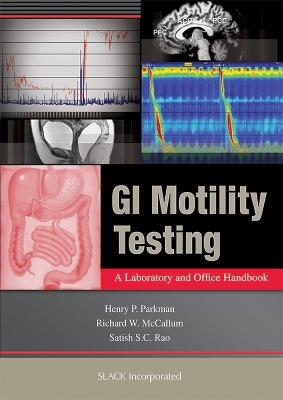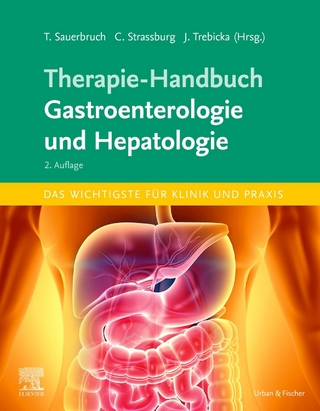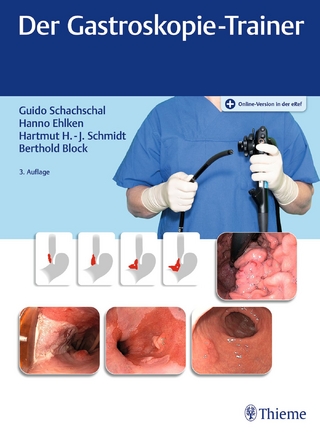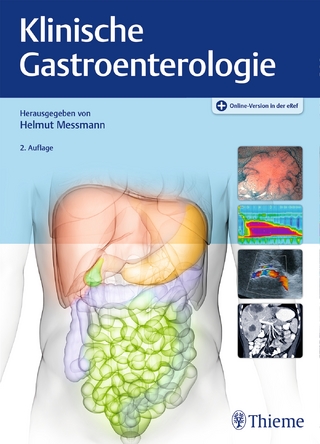
GI Motility Testing
SLACK Incorporated (Verlag)
978-1-55642-958-3 (ISBN)
- Titel ist leider vergriffen;
keine Neuauflage - Artikel merken
Impedance Studies, High Resolution Manometry and Sensitivity Testing in Assessing Esophageal Disorders
Gastric Emptying Scintigraphy
Breath Testing for Carbohydrate Malabsorption and Bacterial Overgrowth
Assessment of Gut Transit with Radiopaque Markers and Scintigraphy
Novel Tests such as Wireless Motility Capsule for Evaluation of Regional and Whole Gut Transit/Motility
Functional Brain Imaging in GI Neurophysiology
Gastroesophageal Reflux Disease
Gastroparesis
Irritable Bowel Syndrome
Constipation
Fecal Incontinence
GI Motility Testing: A Laboratory and Office Handbook carefully explains how to integrate diagnostic information into decision making for day-to-day patient care, making it ideal for gastroenterologists, surgeons, GI fellows, internists, physician assistants, technicians, nurses, and nurse practitioners.
Henry P. Parkman, MD, is Professor of Medicine in the Gastroenterology Section of the Department of Medicine at Temple University School of Medicine. Dr. Parkman's gastroenterology training began with a GI fellowship at the University of Pennsylvania. His research investigated the inhibitory neural circuitry of the lower esophageal sphincter (LES)--the barrier preventing gastroesophageal reflux. At the University of Pennsylvania, he also compared the clinical outcomes and costs of pneumatic dilation and surgical esophagomyotomy for treatment of patients with achalasia, a disorder involving abnormal LES neural control. Dr. Parkman extended his research training with a National Institutes of Health research training fellowship in the Department of Physiology at Mayo Clinic where he studied the inferior mesenteric ganglion and its involvement in colonic motility. Dr. Parkman has been at Temple University School of Medicine for 20 years where he is Director of the Clinical GI Motility Laboratory at Temple University Hospital. He has developed expertise in a comprehensive array of GI motility tests for clinical evaluation of patients, including specialized tests of gastric motility. His clinical research studies have focused primarily on esophageal and gastric motility in normal individuals and on clinical motility disorders of the esophagus and stomach. His main clinical focus has been treating patients with GI motility disorders, primarily gastroparesis. Dr. Parkman is a past President of the American Neurogastroenterology and Motility Society. Dr. Parkman has been co-director of the ANMS Motility Courses held in 2002, 2004, 2006, 2008, and 2010. Richard W. McCallum, MD, FACP, FRACP (Aust), FACG, is Professor and Founding Chairman of the Department of Internal Medicine, Texas Tech University Health Sciences Center at El Paso. Dr. McCallum also serves as the Medical Director of the Diagnostic Center for GI Motility and Functional Bowel Disorders serving as a referral center for patients locally, regionally, and nationally. After completing his undergraduate studies at the University of Queensland, he earned his medical degree at the Queensland Medical School in Brisbane, Australia. Dr. McCallum completed gastroenterology fellowship training at the University of California Los Angeles and Wadsworth VA Medical Center. He joined the faculty of Yale University School of Medicine in 1996. Dr. McCallum was Professor of Medicine, Chief, and Program Director of the Division of Gastroenterology, Hepatology, and Nutrition at the University of Virginia School of Medicine, Charlottesville from 1985 to 1996 where he was awarded the Paul Janssen Endowed Chair and Professorship. From 1996 to 2004, Dr. McCallum was then Chief and Program Director, Division of Gastroenterology and Hepatology, University of Kansas Medical Center, Kansas City. Dr. McCallum was the Director of the Center for GI Nerve and Muscle Function and Chief of Division of GI Motility, University of Kansas School of Medicine from 2004 to 2009. Among his professional honors and memberships are Fellow of the American College of Physicians, Fellow of the Royal Australian College of Physicians, Fellow of the American College of Gastroenterology, member of the American Society for Clinical Investigation, President of the Southern Society for Clinical Investigation, and President of the International Electrogastrogram Society. He is currently a member of the American Neurogastroenterology and Motility Society (ANMS) Council and has been Co-Director of the ANMS courses on Clinical Practice conducted in 2002, 2004, 2006, 2008 and 2010. He was the organizer and host for two national programs for ANMS in Charlottesville, Virginia in 1994 and Kansas City, Kansas in 2002. Dr. McCallum's area of clinical interest and research is the field of GI motility, neurogastroenterology, and functional bowel disorders. He has been focused on advancing knowledge related to pathophysiology, diagnostic approaches, pharmacology, and device technology. He is a pioneer in the area of gut electrophysiology and developed the concept of electrical "pacing" of the stomach to treat gastroparesis, particularly related to diabetes mellitus. Recently he has rediscovered and extensively advanced new knowledge in understanding and managing a cyclic vomiting syndrome in adults. Satish S.C. Rao, MD, PhD, FRCP (Lon), received his MD from Osmania Medical College, Hyderabad, India; his PhD from the University of Sheffield, UK; and the Fellowship of the Royal College of Physicians (FRCP) in London, UK, in 1997. Currently, Dr. Rao is a Professor of Medicine and Director, Neurogastroenterology and GI Motility Program, Department of Internal Medicine, University of Iowa Carver College of Medicine, Iowa City. Dr. Rao is one of a rare breed of academicians who has excelled as an outstanding researcher, distinguished educator, and as a master clinician. Dr. Rao's research interests focus on the pathophysiology and treatment of irritable bowel syndrome, constipation and fecal incontinence, and visceral pain, particularly esophageal chest pain, dietary fructose intolerance, and neurobiological mechanisms of biofeedback therapy. He has pioneered several new techniques of evaluating and treating motility disorders. He has received numerous awards including the American Gastroenterological Association (AGA) Distinguished Clinician Award, AGA Masters Award for Outstanding Clinical Research, and the AGA Distinguished Educator Award. In 2005, he also received the American College of Gastroenterology (ACG) Auxiliary Research Award, the highest research award from ACG. In 2009, he was awarded the International Foundation for Functional GI disorders Senior Clinical Investigator Award and in 2010 the University of Iowa Regents Award for Faculty Excellence. A very productive, federally funded investigator and sought-after speaker, Dr. Rao has edited 3 books, Disorders of the Anorectum (2001), Anorectal and Pelvic Floor Disorders (2008) for Gastroenterology Clinics of North America, and Gastrointestinal Motility--Testsand Problem-Oriented Approach. He has published more than 250 articles. Dr. Rao is a member of several distinguished medical and research societies. He is the current President of the American Neurogastroenterology and Motility Society.
| Erscheint lt. Verlag | 30.10.2010 |
|---|---|
| Zusatzinfo | Illustrations |
| Sprache | englisch |
| Themenwelt | Medizinische Fachgebiete ► Innere Medizin ► Gastroenterologie |
| ISBN-10 | 1-55642-958-4 / 1556429584 |
| ISBN-13 | 978-1-55642-958-3 / 9781556429583 |
| Zustand | Neuware |
| Haben Sie eine Frage zum Produkt? |
aus dem Bereich


